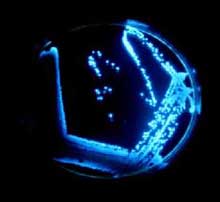Are you familiar with the movie eXistenZ? Though it was primarily a movie designed as a thought experiment to the implications of VR, it offered one very interesting possibility - advanced biological computers. Neurons already reorganize on their own during early development and even in adulthood. What's stopping us from utilizing this technique in hardware? The notion is similar to programming all the GUI components in Java when IDEs (e.g NetBean) already offer visual GUI component creation. We seek chips which may alter themselves, yet biology is already there.
I'm not really sure how it would be implemented (though i can think of a couple methods), but I cannot imagine there isn't a way to utilize reconstructive properties of biological matter, having "logic gates" that interpret the interplay of electrical currents which we create.
We're already capable of using electrodes to analyze and transmit data to and from the brain. I've also heard that we have software that model the brain to such accuracies that people base their research almost entirely off of the firings simulated by it.
Here's an article which might spur the imagination:

Algae and Light Help Injured Mice Walk Again.
Perhaps I'm a dreamer, but what we may accomplish is something any dreamer cannot help but gaze at in wonder.
Edited by mentatpsi, 09 January 2010 - 10:51 PM.













































